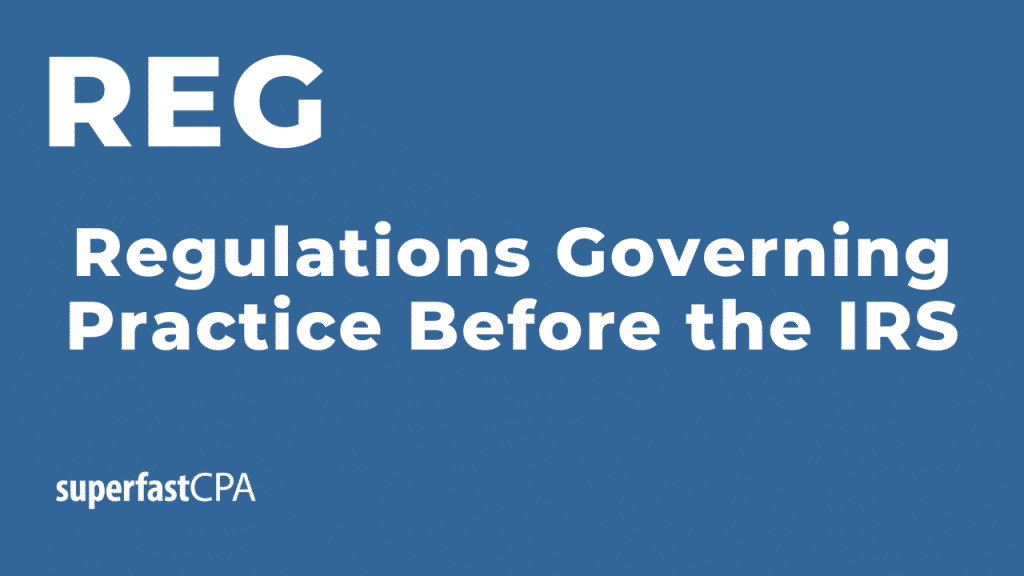The regulations governing practice before the IRS (meaning a CPA representing a client before the IRS) are mainly from the Treasury Department’s Circular 230.
Table of Contents
Defining “Practice before the IRS”
Circular 230 defines practicing before the IRS as:
- All matters connected with presenting to or corresponding with the IRS relating to a taxpayer’s rights, privileges, or liabilities under the laws or regulations administered by the IRS.
- This includes (but is not limited to):
- Preparing & filing documents with the IRS
- Communicating with the IRS
- Representing a client at IRS hearings or meetings
- Rendering written advice with potential for tax avoidance or tax evasion
Who can “practice before the IRS”?
In general, it can only be:
• Attorneys
• CPAs
• Enrolled agents
Summary of Regulations Governing Practice Before the IRS
Below is a summary of some of the most common regulations governing practice before the IRS that you need to know for the REG CPA exam.
Return of Client Records Upon Request
If a client requests their records be returned to them, the CPA must comply, even if the client still owes the CPA money for their services.
Conflicts of Interest with Another Client
A CPA should not represent a client if it would create a conflict of interest, specifically to another client.
However, if a conflict of interest exists, the practitioner may represent a client if:
- The practitioner reasonably believes that the practitioner will be able to provide competent and diligent representation to each affected client
- The representation is not prohibited by law, and
- Each affected client waives the conflict of interest and gives informed consent, confirmed in writing by each client, that they are aware of the conflict of interest
What if a CPA Finds an Error from a Previous Year?
If the CPA finds an error made in a previous year, the CPA must advise the client of the error. However, what to do about it is up to the client. The CPA is NOT required to notify the IRS of the error, and they are not required to file an amended return (the client may choose to do this, but the key is that the only rule in this situation is that the CPA must notify the client of the error).
Are CPAs Required to Verify Information Provided by Clients?
A CPA is not required to verify information provided by a client. The CPA is allowed to rely on good faith regarding the information provided by the client.
Is a CPA Required to Submit Client Records to the IRS?
When an authorized officer or employee of the IRS makes a lawful request for records or information, the CPA is required to submit the records requested unless the CPA believes in good faith and on reasonable grounds that the records or information are privileged.
Do Tax Return Preparers Have to Register with the IRS?
All paid tax return preparers must register with the IRS. Preparers will not represent a taxpayer before the IRS, this is limited to attorneys, CPAs, or an enrolled agent.
CPAs Charging “Unconscionable Fees”
No practitioner may charge “unconscionable” fees for representing a client before the IRS.
Can CPAs Charge Contingent Fees?
A CPA can charge a contingent fee under three circumstances:
1) For services rendered dealing with an IRS examination or challenge to an original return or amended return or claim of refund.
2) When claiming a refund solely for statutory interest or penalties previously assessed by the IRS.
3) If the CPA is representing the client in judicial proceedings dealing with the IRS.
Can CPAs Practice Law?
Even though some CPAs become very familiar with tax law, there is nothing in the regulations that authorizes a CPA to practice law in any form.
Resources
You can find more information on Circular 230 from the IRS website here…













